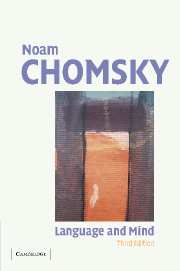Book contents
- Frontmatter
- Contents
- Preface to the third edition
- Preface to the second edition
- Preface to the first edition
- 1 Linguistic contributions to the study of mind: past
- 2 Linguistic contributions to the study of mind: present
- 3 Linguistic contributions to the study of mind: future
- 4 Form and meaning in natural languages
- 5 The formal nature of language
- 6 Linguistics and philosophy
- 7 Biolinguistics and the human capacity
- Index
4 - Form and meaning in natural languages
Published online by Cambridge University Press: 04 September 2012
- Frontmatter
- Contents
- Preface to the third edition
- Preface to the second edition
- Preface to the first edition
- 1 Linguistic contributions to the study of mind: past
- 2 Linguistic contributions to the study of mind: present
- 3 Linguistic contributions to the study of mind: future
- 4 Form and meaning in natural languages
- 5 The formal nature of language
- 6 Linguistics and philosophy
- 7 Biolinguistics and the human capacity
- Index
Summary
When we study human language, we are approaching what some might call the “human essence,” the distinctive qualities of mind that are, so far as we know, unique to man and that are inseparable from any critical phase of human existence, personal or social. Hence the fascination of this study, and, no less, its frustration. The frustration arises from the fact that despite much progress, we remain as incapable as ever before of coming to grips with the core problem of human language, which I take to be this: having mastered a language, one is able to understand an indefinite number of expressions that are new to one's experience, that bear no simple physical resemblance and are in no simple way analogous to the expressions that constitute one's linguistic experience; and one is able, with greater or less facility, to produce such expressions on an appropriate occasion, despite their novelty and independently of detectable stimulus configurations, and to be understood by others who share this still mysterious ability. The normal use of language is, in this sense, a creative activity. This creative aspect of normal language use is one fundamental factor that distinguishes human language from any known system of animal communication.
It is important to bear in mind that the creation of linguistic expressions that are novel but appropriate is the normal mode of language use.
- Type
- Chapter
- Information
- Language and Mind , pp. 88 - 101Publisher: Cambridge University PressPrint publication year: 2006
- 1
- Cited by



